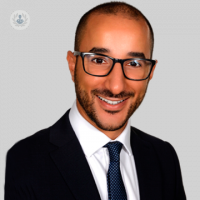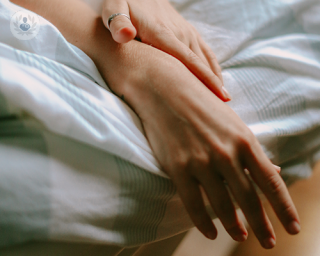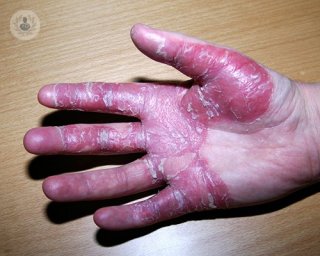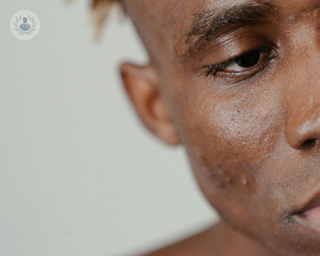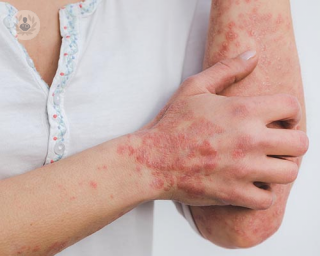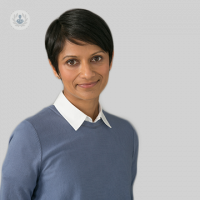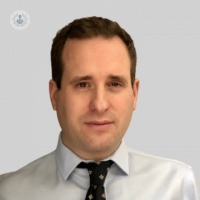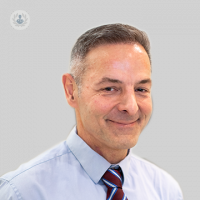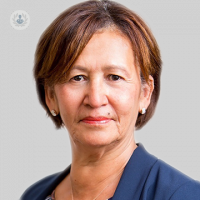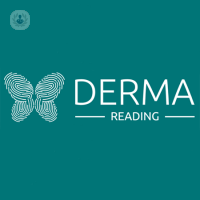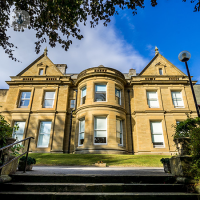Psoriasis
What is psoriasis?
Psoriasis is a condition that affects the skin, causing patches of red rash, and flaky patches of silvery skin, which can sometimes be itchy or sore. The condition can present anywhere, but is most common on the scalp, elbows, knees and lower back. It can affect men and women of any age, but is more common in adults under 35 years old. It is non-contagious and the severity differs between people, with some only affected a little, and others affected greatly. Psoriasis is a chronic condition, meaning that it lasts a long time. It usually has periods with mild or no symptoms, followed by periods of more severe symptoms.
You should see a dermatologist if you are suffering with psoriasis.
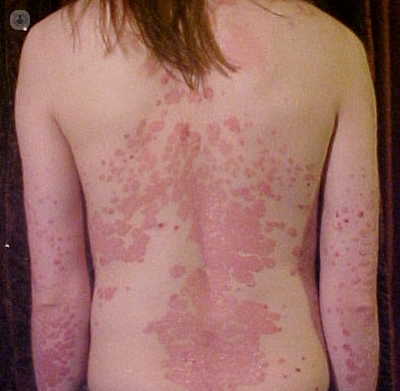
What are the different types?
The most common types of psoriasis are as follows:
Plaque psoriasis
The most common form of psoriasis, and shows as raised, red patches of skin covered with silvery patches of dry skin, known as plaques. Plaques can appear anywhere, but usually appear on elbows, knees, lower back and scalp. The plaques can be sore and itchy, and may crack and bleed in some cases.
Nail psoriasis
The nails are affected in around half of the people with psoriasis. Small dents may appear, and the nails may become discoloured or grow abnormally. The nails can become loose and separate from the nail bed, and in severe cases the nails may crumble.
Guttate psoriasis
This form often starts in childhood, and appears in the form of small, dot like lesions. It is the second most common form of psoriasis. This form often starts after a throat infection, but in most cases will disappear after a few weeks.
Inverse psoriasis
Folds of the skin such as elbows, knees, groin, buttocks and under the breasts are usually affected by this form. It appears as large, red smooth patches, and becomes worse by friction and sweating.
Pustular psoriasis
This is characterised by small, white blisters surrounded by red skin. It is not an infection, or contagious and can affect any part of the body, particularly the hands and feet.
What are the causes of psoriasis?
The cause of psoriasis is unknown, but is due to the skin cells being replaced more quickly than usual, which is possibly a problem with the immune system. The normal process for skin cell production is the production of the new cell in the deeper layers of the skin, the new cells gradually move up through the layers, until they reach the top layer, where they then die and flake off. This usually takes around three to four weeks. With psoriasis, the process only takes three to seven days, causing a build-up of skin cells that are not ready to flake off.
Psoriasis can sometimes be triggered due to injury, stress, smoking, drinking alcohol and certain medications.
What is the treatment for psoriasis?
Mild psoriasis can be treated with skin creams. These can reduce swelling, soreness, itching and reduce the rate of skin cell growth. These may include steroid creams, moisturisers, and coal tar especially in the form of a psoriasis shampoo. More severe forms of psoriasis may be treated with phototherapy. The treatment exposes your skin to ultraviolet light which helps to treat the condition. You may be prescribed a medicine to help cure problems with your immune system that may be leading to psoriasis.
